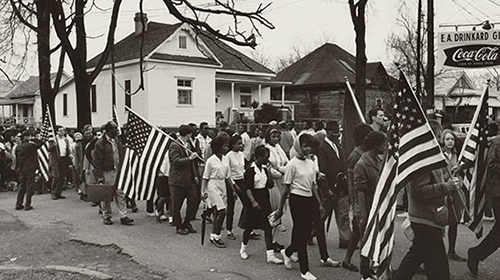
This year marks the 50th anniversary of Martin Luther King Jr.’s historic 1965 march from Selma to Montgomery, Alabama, to demonstrate how vitally important it was that black Americans be able to exercise their fundamental right to vote. In Selma, people died, suffered bodily injury, and went to jail for that right. President Lyndon B. Johnson signed the Voting Rights Act into law a few months after the Selma march – but we’re still fighting voter suppression on many fronts half a century later.
The specific means of suppression have changed, but the objectives haven’t: People in power are still trying to keep specific groups of Americans from voting. Here are a few things to keep an eye on as we keep fighting into 2015.
Winter: The U.S. Supreme Court considers whether to hear appeals from Wisconsin and North Carolina voter suppression cases.
- After our trial judge struck down Wisconsin’s voter ID law, an appeals court overturned that ruling and would have allowed the law to be implemented for the November 2014 elections. The Supreme Court then forbade Wisconsin to require ID for those elections, as the case proceeds through the courts. We have now asked the Supreme Court for a full hearing to decide whether the trial court’s decision will stand permanently.
- In October, an appeals court restored same-day registration and allowed people to have ballots counted outside their precinct in North Carolina for the 2014 elections, while the case works its way through the courts. The Supreme Court then put that ruling on hold, allowing North Carolina to conduct the 2014 elections without these options, and the state has now asked the Supreme Court to fully review the decision of the appeals court.
Spring: Circuit court hears appeal on attorneys’ fees in the Shelby County case.
- Back in 2013, Shelby County, Alabama, persuaded the Supreme Court to dismantle a core part of the Voting Rights Act – the part that the court itself had called the “heart of the Act” in a 1966 opinion. The county then asked for $2 million in compensation, which the district court denied. They’ve now appealed to the D.C. Circuit, which will likely hear the case sometime around the anniversary of the Selma march. Ironic, no?
Summer: Final judgments expected in North Carolina and Ohio district courts.
- While the Supreme Court considers whether to hear the North Carolina appeal, we also have a full trial scheduled for July in the district court. Whereas last summer’s proceedings dealt with whether to stop the voter suppression law from going into effect just for imminent elections, this summer’s trial will deal with whether to permanently strike down the law. This includes the new voter ID provision, which is set to take effect in 2016. (Here’s a refresher on all the gory details of North Carolina’s law.)
- We’re also expecting a final decision on our early voting case in Ohio, potentially by summer’s end. Both sides will be presenting the judge with briefs and expert witness reports throughout the next several months, and we could have a ruling in August or September.
Dr. King said, “Voting is the foundation stone for political action.” We all must work together to make sure that it is not placed in jeopardy.
Learn more about voter suppression and other civil liberty issues: Sign up for breaking news alerts, follow us on Twitter, and like us on Facebook.




